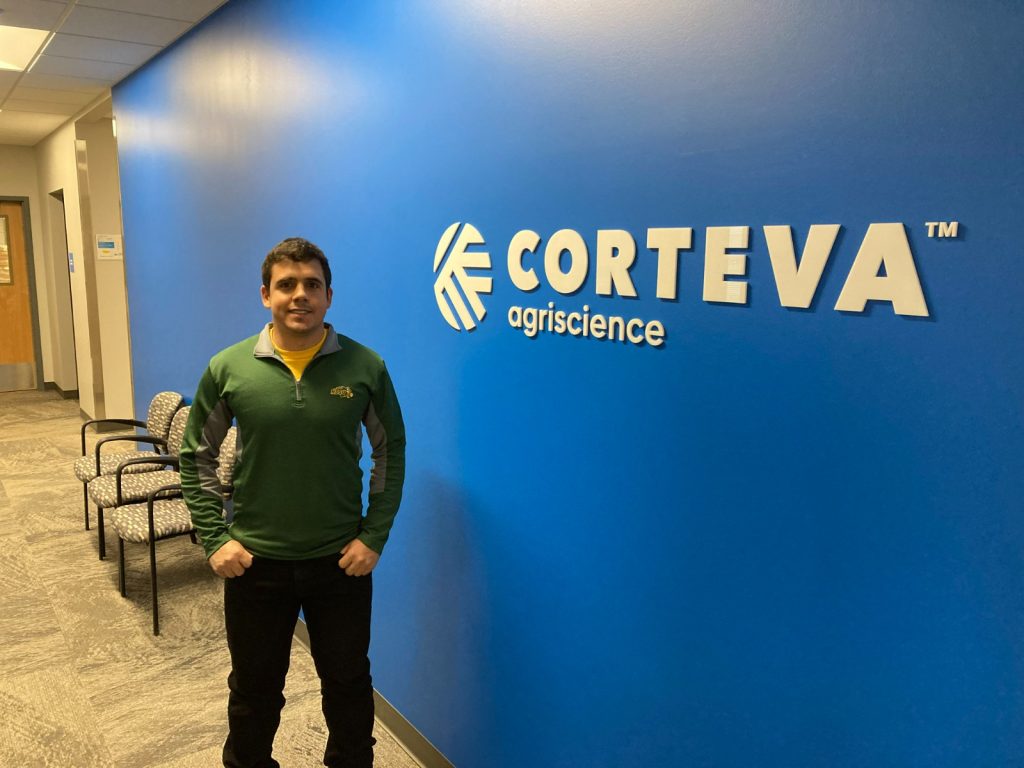
Company: Corteva Agriscience
Major: Master’s – Plant Science
Location of Internship: Wamego, Kansas
Internship Title: DELTA Research Intern
Why did you choose the company that you work for?
Corteva Agriscience is a global agricultural company that has always been a dream workplace for me. With its focus on providing innovative solutions to farmers and growers worldwide, Corteva has established a reputation for its commitment to sustainability and feeding the ever-growing global population. Working at Corteva presents a wealth of opportunities, including: career growth and development, sustainability-driven approach, innovation-focused, positive impact on the world, collaborative work culture, and an attractive compensation and benefits. In conclusion, working at Corteva Agriscience offers a unique combination of professional growth opportunities, a focus on sustainability, and a positive impact on the world.
What were some of the requirements for your internship?
As an intern in Corteva’s hybrid wheat breeding program, I am involved in a wide range of activities aimed at breeding and developing new hybrid wheat varieties. These tasks and responsibilities are dynamic and subject to change based on the needs of the breeding program, but may include: data collection and analysis, cross-pollination, greenhouse and field work, statistical analysis, documentation, and collaboration.
In conclusion, as an intern in Corteva’s hybrid wheat breeding program, I am involved in a variety of tasks aimed at breeding and developing new hybrid wheat varieties that are high-yielding, disease-resistant, and of high quality. The specific responsibilities and tasks may vary based on the needs of the organization and the breeding program, but the ultimate goal is to support the breeding and development of these new hybrid wheat varieties.
What is your favorite part about your internship experience?
The highlight of an internship experience is the ability to put into practice what has been learned in the classroom, as well as acquiring new skills. In my case, I have had the opportunity to:
1. Gain hands-on experience: I have been able to get practical, hands-on experience in my field, which is helping me to build valuable new skills and knowledge.
2. Network: I have also had the opportunity to network with industry professionals, which can be valuable for building connections and finding future job opportunities.
3. Career exploration: This internship has given me the chance to explore different career paths and determine if a specific field or industry is the right fit for me.
4. Skill development: I have been able to enhance my skills, including communication, teamwork, problem-solving, and time management, all of which are crucial for future job success.
5. Boosting confidence: Working in a real-world setting has helped me to build confidence and independence, as I have been given the opportunity to take on meaningful responsibilities and make meaningful contributions to the organization.
These are some of the ways in which this internship has been a valuable experience for me. It has provided me with the opportunity to gain experience, develop new skills, and make important connections in my chosen field.
What is the most challenging part of your internship? How have you overcome these obstacles?
The transition from student to full-time intern can present some challenges, but having the support of my manager and co-workers has made the experience smoother. Despite that, some common obstacles I have faced include:
• Adjusting to the work environment: The work environment can be quite different from what one experiences in the classroom and university tasks.
• Balancing tasks and responsibilities: With multiple tasks and responsibilities, it can be challenging to stay organized and prioritize effectively. To overcome these challenges, it’s important to:
• Ask questions and seek help when needed.
• Stay organized by prioritizing tasks and balancing responsibilities.
• Remain proactive and stay on top of work. Having a positive attitude and seeking support when needed can go a long way in successfully transitioning into a full-time internship role.
How did you find your internship?
Through networking
What advice would you give a student who is in the process of searching and applying for an internship?
My advice is to start early. Don’t wait until the last minute to start your search. Give yourself enough time to research, network, and apply to various opportunities. Network: Utilize your personal and professional network to find out about potential internships. Attend career fairs, reach out to alumni, and talk to your professors to find out about opportunities that align with your interests. Use online resources like company websites, LinkedIn, and internship search websites to learn about the companies and industries you’re interested in. Customize your resume and cover letter to match the requirements and responsibilities listed in the internship description. Highlight relevant coursework, skills, and experiences that show why you’re a good fit for the role. Prepare for the interview. After the interview, send a thank-you note to the interviewer. If you haven’t received a response after a reasonable amount of time, it’s appropriate to send a follow-up email to inquire about the status of your application. Don’t give up: Finding the right internship can take time, so be patient and persistent in your search.


